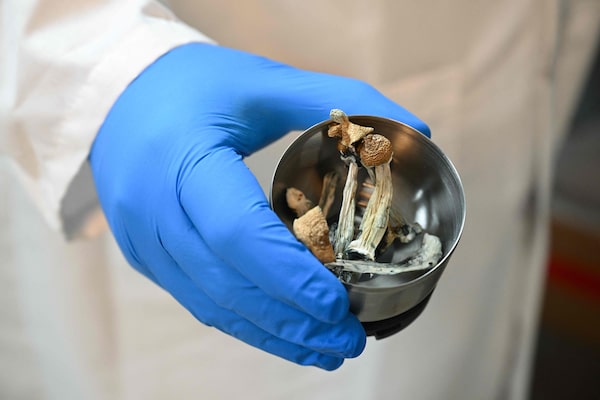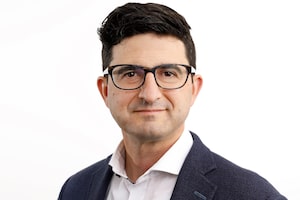
Psilocybe cubensis, known colloquially as psychedelic "magic" mushrooms, are seen at Rose City Laboratories in Portland, Oregon, where the psilocybin-containing mushrooms will be tested for potency in accordance with Oregon state law, on May 10, 2023.ROBYN BECK/AFP/Getty Images
Eight decades after a Swiss scientist accidentally took the first acid trip, psychedelic drugs are advancing toward becoming approved pharmaceutical therapies.
In March, the U.S. Food and Drug Administration granted breakthrough designation to two Canadian-incorporated companies, Mind Medicine (MindMed) Inc. MNMD-Q, and Cybin Inc. CYBN-NE, after their drugs showed promise of delivering substantial improvements over existing therapies for anxiety and depression, respectively. The designations make them eligible for priority review and accelerated approvals.
MindMed’s drug is lysergic acid diethylamide, or LSD; Cybin has developed a variant of psilocybin, the key ingredient in magic mushrooms. “We’re onto a big paradigm shift in efficacy and a way to intervene and stop depressive patients within a day of dosing, with durable and sustainable effects,” Cybin chief executive officer Doug Drysdale said in an interview.
They join three others that have received FDA breakthrough status since 2017 to develop mind-altering psychedelics for mental disorders. That includes Lykos Pharmaceuticals, a spinout of Silicon Valley non-profit Multidisciplinary Association for Psychedelic Studies, which has pushed to legalize MDMA, also known as ecstasy, since its use was restricted and criminalized in 1985.
This August, Lykos could win FDA approval to market its version of MDMA after it reported that 71 per cent of post-traumatic stress disorder patients in a trial showed no symptoms 18 weeks after taking the drug. Compass Pathways PLC of Britain and Fitchburg, Wis.-based Usona Institute have also launched expanded human trials to test psilocybin drugs on patients with major depression.
Meanwhile, Spravato, a nasal-spray variant of the hallucinogenic anesthetic ketamine for treatment-resistant depression, is Johnson & Johnson’s fastest-selling drug: Revenue in 2023 reached US$689-million, up 84 per cent from 2022, and could well exceed US$1-billion at peak, the pharma giant predicts. Although Spravato is not technically a psychedelic, it “has finally gotten investors comfortable with the fact there is the science, a reimbursement pathway and some analogue” for psychedelics, Mr. Drysdale said.
Those proof points have fuelled a recent surge in financings for psychedelics developers. That includes Toronto-based Cybin, which raised US$150-million in a private placement last month and revealed that three-quarters of patients with major depression who took two doses of its drug in a trial were in remission four months later.
MindMed, based in New York but incorporated in B.C., also raised US$175-million in March based on similarly strong results. Both tapped seasoned biotech investors, including RA Capital Management, Deep Track Capital and Octagon Capital, and will use the money to fund more trials. Compass and Lykos also raised nine-figure sums in the past year.
“The difference between psychedelics and cannabis is that psychedelics have demonstrated profound clinical outcomes,” said Brian Bloom, CEO of Toronto’s Bloom Burton & Co., which underwrote the Cybin deal. “There will be many psychedelic drugs that are approved and they will have an impact in neuropsychiatry and trauma-related disorders.”
The market potential for new, approved mental-health drugs could be big: Major depression alone affects 300 million-plus people globally, and there have been no new types of regulated treatments this century. But questions continue to swirl around the commercial viability of drugs that reorder the mind, open up consciousness and take users on out-of-body journeys – particularly ketamine, which Elon Musk uses regularly, and which was blamed for the 2023 death of Friends star Matthew Perry.
Many of the concerns aren’t about safety but whether there is a sound business case for selling psychedelics as regulated drugs, which may be why pharma giants haven’t shown much interest yet. “There are a lot of nuanced questions I imagine Big Pharma wants answered first, particularly around commercialization,” said Jefferies LLC biotechnology analyst Andrew Tsai.
It’s been a long, strange trip for psychedelics ever since Albert Hofmann accidentally discovered LSD’s potency when he absorbed it through his fingertips in 1943, five years after discovering the compound while researching rye fungus for drug company Sandoz. “Psychonauts” – legalization advocates including spiritual leaders, scientists and wealthy funders – have long maintained that psychedelics deliver health benefits. Studies in the 1950s and 60s bore that out.
People who had good trips spread the word, including Alcoholics Anonymous co-founder Bill Wilson; Harvard psychologist Timothy Leary, who lost his job and urged young people to “turn on, tune in, drop out”; and author Ken Kesey, a subject in CIA experiments involving LSD who helped birth the hippie movement by providing the drug at “acid test” parties. As concern grew about a drug-fuelled countercultural backlash during the Vietnam War, U.S. president Richard Nixon signed the Controlled Substances Act into law in 1970, labelling psychedelics as restricted Schedule 1 drugs deemed to have “no currently accepted medical use.” Other countries, including Canada, followed.
Illicit recreational use continued but official lab work all but stopped until 2000, when Johns Hopkins University researchers obtained FDA authorization to do trials. That helped spark a revival of interest in legalizing psychedelics, and some states have decriminalized psilocybin. Last year, the FDA for the first time published draft guidelines advising researchers on designing clinical trials for psychedelics, acknowledging growing interest in their therapeutic potential.
A spokeswoman for Canadian Mental Health and Addictions Minister Ya’ara Saks said: “Health Canada recognizes the growing interest in the use of psychedelic-assisted psychotherapy and ongoing research looking at its potential,” although the drugs remain restricted here.
The psychedelic renaissance has made for strange bedfellows. Silicon Valley leaders such as Mr. Musk and OpenAI’s Sam Altman are proponents, as are former Texas governor Rick Perry and TV personality Kevin O’Leary. New York Mets owner and hedge-fund billionaire Steven Cohen funds psychedelic research and invests in Cybin. Football star Aaron Rogers has claimed the psychoactive drink ayahuasca improved his play; Prince Harry has credited psychedelics for helping him deal with grief.
Investor interest fuelled a hype cycle as dozens of psychedelic startups raised money in 2020 and 2021, many led by opportunists who thought LSD and fungi were the next cannabis. (Cybin, founded by three cannabis entrepreneurs, and MindMed went public on the NEO Exchange in 2020 through reverse takeovers of Canadian shell companies.) Their stocks then crashed during the biotech downturn. “That was a pretty bad introduction,” Mr. Bloom said.
Many companies died, were bought or shifted focus; Cybin ditched a strategy to grow magic mushrooms for regulated and unregulated use to concentrate instead on developing approved pharmaceuticals. Companies that continued to raise money had to issue stock at low prices, diluting shareholders. Cybin’s March funding more than doubled its outstanding share count as it sold 349 million shares for 43 US cents each.
Winning back burned investors is not the only challenge. Many psychedelic compounds were discovered decades ago, raising concerns about patent protection. “It’s a question we get a lot” from investors, said MindMed chief medical officer Dan Karlin. “Clearly we can’t get composition-of-matter patent protection for a molecule that is 85 years old.”
MindMed has instead filed for patents on manufacturing processes and formulations, and is depending on marketing exclusivity it hopes to get from the FDA. Cybin’s compound is more novel as it incorporates deuterium, an isotope found in meteorites. “There’s stardust in this,” joked Mr. Drysdale, a veteran biopharma industry executive, “making it more potent and dosable in smaller amounts.”
There are little data comparing the effectiveness of psychedelics to standard treatments such as selective serotonin reuptake inhibitors including Zoloft or Prozac, whose generic versions cost patients about US$10 a month. It’s unknown how much regulated drugs would cost, whether insurers would cover them, if states and provinces would permit them, or how much manufacturers could rely on sales if they work with few doses.
While illicit recreational versions sell for tens of dollars a dose, regulated psychedelics would cost much more, but would be aimed at different users for medical needs. The drugs would be complicated and costly to administer, requiring clinical oversight, likely with a psychotherapist or psychiatrist present, for hours in controlled, mood-friendly spaces, not unsupervised home use.
Nonetheless, Mr. Karlin said, “I don’t think it’s a question of ‘Will Big Pharma companies get involved in the class and this concept of more interventional psychiatric drugs?’ but ‘When.’”
 Sean Silcoff
Sean Silcoff